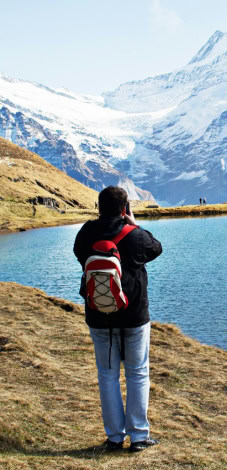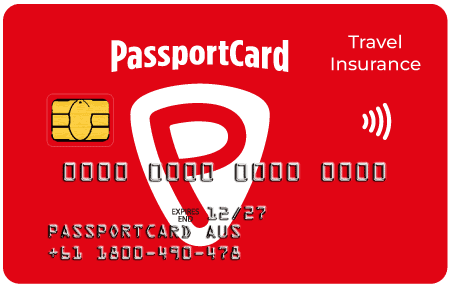

Switzerland Travel Guide
Switzerland’s soaring Alps, lush mountain valleys, and charming cities offer travellers an enriching and diverse experience.
Authentic Swiss chocolate delights foodies, whereas sublime Alpine reaches and picturesque villages provide a reprieve from urban life. Others come for this landlocked country’s interesting history and culture, while some prefer the slopes over summertime attractions.
In short, there’s something for everyone in Switzerland.
However, no Swiss holiday is perfect without the right preparation. In this guide, we’ll go over what you need to know before you set off, plus where travel insurance fits in.
Best ways to experience Switzerland
Although smaller than its neighbours, Switzerland has great cultural and historical breadth thanks to four distinct linguistic regions and its twenty-six cantons (which are similar to states or provinces).
The country’s geographic location within the heart of Western Europe also provides so much natural beauty that travellers find it hard to fit all the best spots into one itinerary.
As a result, it helps to be selective about what you see and do. To get you started, here are a few favourites to consider on your Swiss holiday:
- Visit the intellectual city of Basel – Basel is not only the country’s oldest university city but a cultural hub. Budding historians can explore over 40 museums, each providing something special for children or adults. You can also visit Old Town and bask in storybook architecture as you treat yourself to artisanal goods. For summer holidays, leap into the Rhine River or tour the romantic Merian Gärten.
- Immerse yourself in fairytale-like Grindelwald – This village is a quintessential Swiss holiday for many. Featuring traditional wooden chalets, green pastures, and cows, Grindelwald is nestled beneath the Alps. Here, you can enjoy romantic walking trails and restaurants or partake in the Chästeilet cheese festival during autumn. There is also a walkable wild glacier canyon and an aerial cableway up to the First, a mountain with adventure activities to enchant you.
- Hike and ski at Zermatt – At the foot of the grand Matterhorn lies the town of Zermatt. Zermatt is a favourite among winter sports and outdoor enthusiasts due to its many rail tours, slopes, and lookout points. In addition, some come to pay respects at the mountaineers’ cemetery and learn about the history of the region, while others take on the ski challenge of the Haute Route.
- Spend a leisurely day at Valle Verzasca – For a change of pace, we recommend visiting Valle Verzasca in the Italian-speaking region of the Ticino canton. On a perfect summer day, travellers hike, bike, or swim. The water itself is refreshingly ice-cold and stunningly clear. You can also check out the area’s famous mediaeval bridge or sign up for bungee jumping at the Contra Dam.
- Enjoy the panoramic views of the Glacier Express – Switzerland is known for its train lines, one of the most famous being the Glacier Express. Focused on leisure, the train takes around eight hours, starting in Zermatt and ending in St. Moritz. You’ll see the Alps up close and personal, alongside beautiful valleys and famous landmarks.
Visiting Switzerland
Climate
As it lies in the Northern Hemisphere, Switzerland’s seasons are flipped from Australia’s. Altitude impacts the climate as well.
Lower, southern regions near the Italian border have Mediterranean-like weather, while the northern and central areas are cooler and more temperate.
Generally, however, spring (March to May) is cool and lush with the mountain wildflowers coming to life. Summer (June to August) is usually pleasantly warm, though be mindful of heatwaves. Meanwhile, autumn (September to November) brings crisp air and vibrant changes, whereas winters are cold and typically see light to heavy snowfall.
Thanks to the landscape and seasons, any time is a good time to visit Switzerland. Keep in mind that mid to late summer is the high season for tourism. For ideal winter sports conditions, visit between December to March.
Culture and language
Switzerland has four official languages: German, French, Italian, and Romansh. Each language corresponds to different regions, with rich and unique cultural connotations.
That said, across the country, there is a strong national identity. Swiss people are known to be polite and private. They value their personal space and punctuality. Most people also speak Swiss German, which is distinct from the native language of Germany.
In contrast, southern Switzerland displays strong Italian influences in its architecture, cuisine, and dialects. French speakers largely live in western regions where you’ll find Protestant influences and beautiful cities like Geneva.
Finally, Romansh is mostly spoken in the canton of Grisons, which is notably culturally diverse but has deep roots embedded in mountain traditions.
English is widely spoken. In fact, it’s typical to meet Swiss people who speak English as a second language more often than other national languages. You’ll primarily find English speakers in cities, however.
To limit communication issues, download translation apps and try to learn some of the local languages. In addition, while you visit, research regional and national customs.
For example, many shops and services close on Sunday, so you’ll have to plan appropriately. It’s also important to respect the Swiss way of life, which is more reserved and quiet than other countries.
Getting around
Although highly walkable, Switzerland’s cities feature a well-maintained and accessible transportation system. Walking is preferable in areas like Grindelwald with designated trails. Meanwhile, more rural areas may require you to rent a car or take a funicular.
The most popular method of transportation between regions is trains, which Switzerland is famous for. The Glacier and Bernina Express are celebrated by travellers because of their scenic offerings. However, non-tourist-focused train lines are less costly and often just as pleasurable.
If you’re staying in certain cities like Zurich or Basel, opt for the tramway systems. Trams run often and cut down on walking time. Alternatively, you can rent a bike. Switzerland has well-developed bike roads and paths.
Cycling is also popular outside the city. There are several national routes, such as the Rhine and Alpine Panorama Routes, geared toward experienced cyclists. In addition, be sure to look up weather and road conditions before you trek out as certain paths may be blocked or diverted.
Accommodation
In Switzerland, hostels are popular for solo travellers, while hotels supply comfort at different price points. Skiers can also reserve resort mountain huts with dorm-style lodgings.
If possible, try to book ahead. Accommodation is costly during the high season and goes quickly, especially if you’re on a budget and intend to go to the more popular areas.
Entry requirements
Switzerland is part of the Schengen Area, which means that Australians can usually enter the country without a visa and stay for up to 90 days. Beyond 90 days, you’ll need a permit.
From November 2024 onwards, Australians also need to have their biometrics registered for the European Entry/Exit System (EES). Doing so replaces passport stamps, though you’ll still be required to keep your passport or another form of ID on you.
To learn more, visit the official Smartraveller website and the website of the nearest Swiss embassy. Stay up-to-date on travel requirements or alerts before you leave and during your holiday.
All benefits and covers are subject to the terms, conditions, limitations and exclusions listed in the Combined Financial Services Guide and Product Disclosure Statement (PDS) and on other policy documentation, including the schedule.
Please refer to the relevant PDS before purchasing our travel insurance to understand what is, and is not, covered by the policy to ensure it is the right cover for you.
Switzerland travel insurance FAQs
It’s always a good idea to get travel insurance if you’re travelling to Switzerland. All hospitals in Switzerland are private, which means you may need to pay in advance to receive treatment. Out-of-pocket costs are also much higher compared to Australia. Getting travel insurance helps you cover these costs. Furthermore, travel insurance with instant claims protects against common hazards like lost luggage, delays, and cancellations by quickly covering fees so you can enjoy your holiday.
The best way to find out how much it will cost to get cover to travel to Switzerland is to get an instant quote with PassportCard. It only takes a couple of minutes to get a personalised quote by providing some basic details such as your age, destination/s, travel dates, and the level of coverage you would like.
No. Medicare can only cover you if you’re within Australia. Switzerland also doesn’t have a reciprocal agreement with Australia, meaning there’s no policy to potentially protect you during medical emergencies or evacuation. Purchasing travel insurance ensures you won’t be left to foot the bill if you become seriously sick or injured while you’re abroad.
Absolutely. Simply add Winter Sports Comprehensive cover when you complete your quote and the cover will be automatically included with your travel insurance policy. Make sure you read the relevant PDS prior to purchase as inclusions can vary depending on the type of policy you choose.
Simply call our Global Assistance team on +61 1800 490 478 or contact us on WhatsApp. Our Australian-based Global Assistance team is available 24/7 and can quickly handle most common claims on-the-spot over the phone.
Preparing for your trip to Switzerland
Ready for your trip to Switzerland?
Here are a couple of items you should check off your list before you leave:
- Make sure your passport is valid for at least 6 months from the date you plan to leave the country.
- Register for a permit if you intend to stay in Switzerland for more than 90 days
- Be sure to carry your passport or another form of identification as it’s required by law. Keep your passport secure on your person and report to the local authorities, as well as the nearest Australian embassy, if it’s stolen or lost
- Get up-to-date on your vaccinations. Switzerland doesn’t require Australian travellers to present an international COVID-19 vaccination certificate, but government advisories recommend getting the vaccine, especially if you’re at risk
- Take precautions against tick bites while in Switzerland through sprays and proper clothing. Tick-borne encephalitis is found in some regions
- Be cautious of pickpockets and other forms of theft. Petty crime is common in popular tourist areas and at night. Look out for scammers on the street and notify local authorities of any incidents as soon as possible
- Stay up to date on the weather. Heatwaves during the summer are potentially dangerous, while winter travellers going to the Alps may encounter avalanches, flash floods, rock falls, and mudslides
- If you’re participating in winter sports, stay on designated slopes and do not venture into off-piste areas
- Arrange for a travel currency card or another method of payment while you’re travelling. Most places take debit or credit cards, but carrying some Euro (EUR) with you is ideal for small payments or in rural areas. Airports often help you exchange cash for local currency
- Notify your financial institution of your plans to travel
- Contact your phone provider to ensure your phone plan will cover you while you’re away or purchase a prepaid international sim card
- Arrange reputable accommodation for each location you plan to stay in
- Consider booking any tours or activities you want to do in advance
- If you’re travelling solo, provide details of your travel plans to a family member or close friend so you can be contacted in case of an emergency
- Research the local laws to ensure you’re aware of what is and isn’t acceptable in Switzerland
- Save the details of how to access emergency consular assistance in case you need it. Create safety plans and educate your children if you intend to travel with children
- Organise your travel insurance with PassportCard
Get covered for your trip to Switzerland with PassportCard



Instant payouts on approved claims with PassportCard
When you choose PassportCard, you’ll enjoy the extra peace of mind of knowing you’ll be able to cover most expenses there and then if something goes wrong.
When you purchase one of our travel insurance policies, we’ll ask you if you’d like a PassportCard to take with you on your trip. If something happens while you’re away (like your luggage is delayed, your cash is stolen or you experience a medical issue), our team can handle your claim quickly over the phone and transfer funds to your PassportCard on-the-spot**.
If approved, you’ll be able to withdraw cash to cover expenses that can arise from things like delayed luggage or stolen cash, or if it’s a medical issue, we can instantly add funds to your PassportCard so you can immediately pay for expenses when you need to.
You won’t need to fill out any paperwork and instant access to funds means you won’t be left out of pocket.
Find out more about how instant claims work or get a quote for your upcoming trip.













